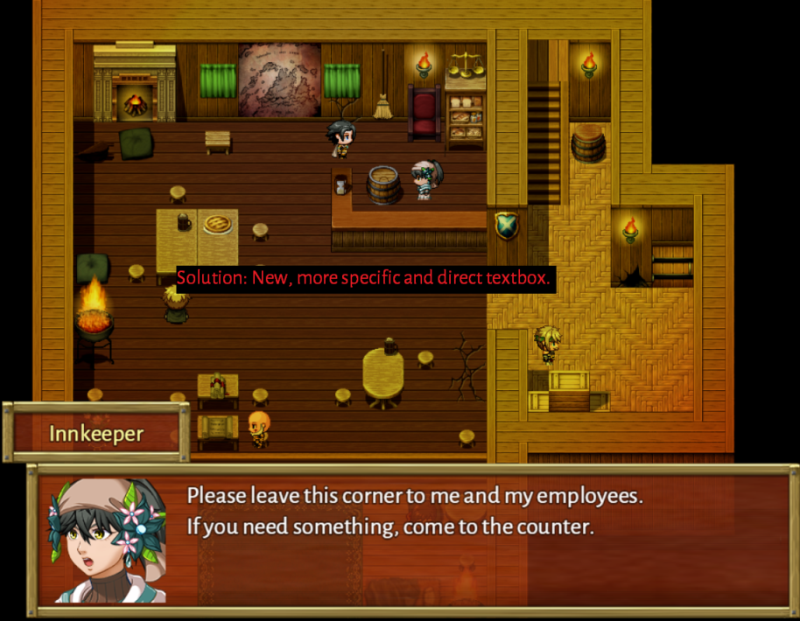WRONG LITERACY ASSUMPTION – FIXING A BAD DESIGN
We made a mistake in our design and we think it’s quite an interesting one, even if it’s rather small.
 MoralAnxietyStudio
MoralAnxietyStudio- 06/08/2017 08:13 AM
- 7797 views
After entering the beta stage of The Tavern we had to fix various details and problems, but one of them caught me yesterday completely by surprise. It involves the basic player’s literacy, and to be more specific: the wrong assumption, that an action I though is obvious turned out to not be intuitive at all. We didn’t figure it out for a year, until one player, who is not a big fan of RPGs, described to me his experience.
If you are not sure what the “game literacy” is, you may want to watch this episode of Extra Credits first:
Let’s describe the problem we encountered. Yesterday, a new player gave a chance to our pre-released build of the game. Since he’s not very passionate about RPGs or Visual Novels, he showed us a new perspective of an outsider. And, turns out, early into the game he faced a problem we didn’t know exists.
Context: The player enters the tavern with a goal: “speak with the innkeeper”. We assumed it’s quite an easy thing to do.

Well, in about 19 out of 20 cases we were right. But yesterday’s player experience showed us we were wrong assuming that “interacting with a counter” is going to be obvious for everyone. First of all, the majority of the game interactions is available only during a direct contact with a person/object – and “using” a counter is NOT a direct contact with an innkeeper.

Also – if someone is not a fan of RPGs, tabletop RPGs or, well, drinking in pubs in general, he or she may just not think that speaking over a counter is a basic convention. Also, we wanted to make this entire environment slightly more realistic than in generic high-fantasy RPGs, so the player sees an open space right next to the wall.

And then: a problem shows up. And in result, the player didn’t even speak with the innkeeper at all. He just moved forward. What is not bad and the game could easily carry on, but the player didn’t Want to skip this part. He was just confused about how he should do this.

Let’s describe the mistake I made while designing this part of the game. I thought that interacting with something that looks like a pub counter is going to be an obvious choice if someone is going to talk with the innkeeper. But the more I thought about, the more I realized it’s not obvious at all. It’s not a part of basic game literacy. It’s a weird and cryptic part of RPG/adventure gaming subculture. Something repeated so many times that I didn’t think it through, even though I should.
We had to fix it. So we did:

In my next project I can’t let this happen. And I have to be sure mistakes like this are not going to be eliminated before our release.
- Aureus
If you are not sure what the “game literacy” is, you may want to watch this episode of Extra Credits first:
Let’s describe the problem we encountered. Yesterday, a new player gave a chance to our pre-released build of the game. Since he’s not very passionate about RPGs or Visual Novels, he showed us a new perspective of an outsider. And, turns out, early into the game he faced a problem we didn’t know exists.
Context: The player enters the tavern with a goal: “speak with the innkeeper”. We assumed it’s quite an easy thing to do.

Well, in about 19 out of 20 cases we were right. But yesterday’s player experience showed us we were wrong assuming that “interacting with a counter” is going to be obvious for everyone. First of all, the majority of the game interactions is available only during a direct contact with a person/object – and “using” a counter is NOT a direct contact with an innkeeper.

Also – if someone is not a fan of RPGs, tabletop RPGs or, well, drinking in pubs in general, he or she may just not think that speaking over a counter is a basic convention. Also, we wanted to make this entire environment slightly more realistic than in generic high-fantasy RPGs, so the player sees an open space right next to the wall.

And then: a problem shows up. And in result, the player didn’t even speak with the innkeeper at all. He just moved forward. What is not bad and the game could easily carry on, but the player didn’t Want to skip this part. He was just confused about how he should do this.

Let’s describe the mistake I made while designing this part of the game. I thought that interacting with something that looks like a pub counter is going to be an obvious choice if someone is going to talk with the innkeeper. But the more I thought about, the more I realized it’s not obvious at all. It’s not a part of basic game literacy. It’s a weird and cryptic part of RPG/adventure gaming subculture. Something repeated so many times that I didn’t think it through, even though I should.
We had to fix it. So we did:

In my next project I can’t let this happen. And I have to be sure mistakes like this are not going to be eliminated before our release.
- Aureus
Posts 

Pages:
1
You could add a bell-ringer. And... is this a blog for your game? Pretty much has the feel of it.
It was meant to have a tutorial-like vibe. I think a blog should be targeted toward players, this one is definitely meant for developers.
- Aureus
- Aureus
I don't know, this seems more like a blog.
Telling people that they have to think of every player who boots the game up is not only a common worry but an impossible one to actually acheive.
I get why this can been seen as advice, but nothing about it screams "tutorial" and that's probably because it seems you're just talking about your game and a single instance.
Better advice is not to adhere to one group of people. Obviously, if you can convey the same message in a better way that works for everyone then awesome. But don't stress about trying figure out every detail for the gaming-inclined.
Telling people that they have to think of every player who boots the game up is not only a common worry but an impossible one to actually acheive.
I get why this can been seen as advice, but nothing about it screams "tutorial" and that's probably because it seems you're just talking about your game and a single instance.
Better advice is not to adhere to one group of people. Obviously, if you can convey the same message in a better way that works for everyone then awesome. But don't stress about trying figure out every detail for the gaming-inclined.
Thank you for reading and commenting. : )
I've noticed RPG Maker community is mostly not afraid of being cryptic and unclear about their choices since RPGM games are mostly played by RPGM users/developers. That's why I almost never see anyone replacing weird option terms like "BGS Volume", "BGM Volume" or "Always Dash" with, for example, "Music Volume", "Ambient Volume" and "Always Run". Even though for an average not-RPGMexperienced-player it would be much more friendly.
Just an engine mark, I guess. People don't play our games, so we're not used to making outsider-friendly designs. I hope to not fall in the same trap.
- Aureus
I've noticed RPG Maker community is mostly not afraid of being cryptic and unclear about their choices since RPGM games are mostly played by RPGM users/developers. That's why I almost never see anyone replacing weird option terms like "BGS Volume", "BGM Volume" or "Always Dash" with, for example, "Music Volume", "Ambient Volume" and "Always Run". Even though for an average not-RPGMexperienced-player it would be much more friendly.
Just an engine mark, I guess. People don't play our games, so we're not used to making outsider-friendly designs. I hope to not fall in the same trap.
- Aureus
(Hey! Extra Credits! I love that channel! :D )
I'm gonna be the one who disagrees... somewhat. I think this is a great tutorial and something everybody on this site should learn, because I've faced so many games with crappy design that now it's hard to me to get back to playing RM games. HOWEVER, it's written like a blog. MoralAnxietyStudio, you should try to reword this article so it sounds more like an article and less like a blog.
YES. THIS. I AGREE COMPLETELY.
In the case of RM games you don't need the level of intuitiveness AAA games need; the level of intuitiveness you need should be equal to what a gamer not used to play RM games can think of. Our games aren't going to be played by outsiders (most likely), but what if one day you create the new successful game (like OFF, for example)? What will you do if your game ends up with the same complaint of "this thing is hard to understand"? That's why you needed to take into account game design. Game design is as important as storyline, something this site fails to see very often.
I'm gonna be the one who disagrees... somewhat. I think this is a great tutorial and something everybody on this site should learn, because I've faced so many games with crappy design that now it's hard to me to get back to playing RM games. HOWEVER, it's written like a blog. MoralAnxietyStudio, you should try to reword this article so it sounds more like an article and less like a blog.
author=MoralAnxietyStudio
I've noticed RPG Maker community is mostly not afraid of being cryptic and unclear about their choices since RPGM games are mostly played by RPGM users/developers. That's why I almost never see anyone replacing weird option terms like "BGS Volume", "BGM Volume" or "Always Dash" with, for example, "Music Volume", "Ambient Volume" and "Always Run". Even though for an average not-RPGMexperienced-player it would be much more friendly.
Just an engine mark, I guess. People don't play our games, so we're not used to making outsider-friendly designs. I hope to not fall in the same trap.
YES. THIS. I AGREE COMPLETELY.
In the case of RM games you don't need the level of intuitiveness AAA games need; the level of intuitiveness you need should be equal to what a gamer not used to play RM games can think of. Our games aren't going to be played by outsiders (most likely), but what if one day you create the new successful game (like OFF, for example)? What will you do if your game ends up with the same complaint of "this thing is hard to understand"? That's why you needed to take into account game design. Game design is as important as storyline, something this site fails to see very often.
The issue you're facing is actually a lack of consistency. To interact with an entity, you need to stand next to it. So the "counter interaction" is not consistent with respect to a "regular interaction". Consequently, the new type of interaction needs to be explained to the player. RPG players faced this inconsistency before and know a way around it. So lazy designers get away with it. But you should always be on the lookout for situations that aren't consistent with rules previously established in your game and explain the new rule clearly, like you did.
Pages:
1


















